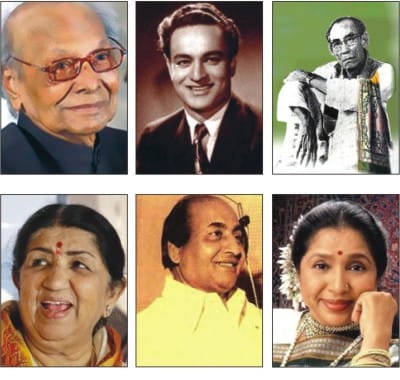Of Men, Music & Movies

Clockwise from top(Left): Naushad, Mukesh, SD Burman, Lata Mangeshkar, Mohammed Rafi, Asha Bhosle.
Film music has come a long way since its introduction in the early 1930s. Its impact on films has been so profound -- albeit only for the songs --- that the music director is a star, second only to the lead players.
In the early 1960s, the publicity line for Mehboob's “Son of India” was “Chaalis crore mein ek Naushad (There is one Naushad in forty crore)”. It was not a star studded film, so Naushad was the “star”. Again in 1971, Biswajit Tanuja, were not Uttam-Suchitra, so they were sidelined in the “Chaitali” poster. Instead the poster said, “After 25 years comes Sachin Dev Burman”, heralding the maestro's re-entry to the Bangla film industry.
There were some illustrious Hindi film composers of the bygone era who were supremely talented. They had style, flair, dedication and pride. And they dictated terms to the producers, directors, lyricists and singers. They had idiosyncrasies too!
The Barisal composer Anil Biswas was one big man who gave Mukesh the much needed break with the “Darbari” lilt, “Dil jalta hai” (“Pehli Nazar” 1945) and Talat the silky glossy tonal triumph with “Aei dil mujhe aisi jaga le chal” (“Arzoo” 1950). But he dismissed Rafi as a singer. His disregard for him was so acute that he once made a public statement that Rafi was no singer at all!
At the other end, Naushad Ali harped a totally different tune. He chose Rafi to be his lead singer, dumping Mukesh and Talat in quick succession, though both of them had earlier tuned very well with him. God knows why Naushad dropped Mukesh whom he had groomed to sound “not like Saigal”!
Talat's case was even sadder. Naushad put him out in the cold for 10 years allegedly for “smoking” in front of him. But I guess the maestro avoided Talat as he had an inner desire to have his own singer Rafi just as Anil Biswas had Talat while Shanker Jaikishan favoured Mukesh. From “Aan” in 1952, Rafi was his only tool as if there were no other male singers. He did give Hemant Kumar and Manna Dey a song or two. Maybe Rafi was then too ill to be in the rehearsals.
The near genius Salil Chowdhury, who tapped the “resonance” in Mukesh's voice so well, had little to do with Rafi. Rumours say that Rafi had to sing 30 times before “Tute huye khwabo ne” of “Madhumati” was okayed. Unless it was really essential for the film, Salil avoided Rafi. Salil felt that after “Baiju Bawra”, success had gone to Rafi's head and he often added “gimmicks” in his rendition. Despite accepting Rafi as a great singer, Salil Chowdhury had little business with him except for that pearl like song “Tasveer teri dil mein” (Bangla “Ogo aar kichu tou noi”) or the tricky “Jungal mein mor nache” in “Madhumati”.
Om Prakash Nayyar, popularly known as OP, had guts from day one! In his maiden break, he approached Lata for a song but Lata, then in the company of star composers like Anil Biswas, Naushad, C Ramchandra and SD Burman, had no time for a such a “small timer”. OP never forgave her. He made his career without Lata's support and poured his finest compositions through Asha, who was then only a poor man's Lata. And in his salad days, when the Dhaka-born Shakti Samanta wanted him to compose for “Kashmir Ki Kali', the rhythm master, as he was then known, needed a “Chevrolet Impala” to set his fingers on the harmonium. The next day SS got him one. And OP wrote tunes for him like “Diwana hua badal” and “Isharon mein isharon mein”.
Lata recorded a song for “Jeevan Jyoti” but the composer, SD Burman, was not too happy with the rendition. So assistant Jaidev called her for a re-recording of the song. But Lata was unable to give the exact date as she was leaving for overseas. This busted the old man's ego. He closed his music chapters for her for six long years until son Pancham (RD Burman) brought her home for rehearsals for his maiden film “Chote Nawab”.
It does not end here. In the early 1960s Dhaka's Robin Ghosh recorded a song in Noorjehan's voice for the film “Sawaali”. Noorjehan sang the way “she wanted”. After all, she was then in the company of composers like Khurshid Anwar, Master Inayat Hussain and Rashid Attre while Robin was new in the industry. The film did not see the light of day. Robin Ghosh never went back to her even when he was in Pakistan despite Noorjehan's “messages” to him for songs.
And then there was the tart tongued Sajjad Hussain of “Ye hawa yeh raat yeh chandni” by Talat, also known for its orchestral beauty. He was one master composer that Anil Biswas had tremendous respect for. “He was the only one who never lifted tunes from any source, we all did,” Anil Biswas once told me; and this hard-to-satisfy composer during one of his recordings, firmly reprimanded Lata:
“Yeh Naushad miyan ka gaana nahin hai, aapko mehnat karna pade ga”.
(This is not Mr. Naushad's song. You have to work hard on it)
That too came after Naushad's “More saiyaan ji”, in raaga Pilu for “Uran Khatola”. And, mind you, to Sajjad Hussain, Lata was the finale to singing and there was only one film composer -- SD Burman -- but as an afterthought had added “that also because of Lata.”

 For all latest news, follow The Daily Star's Google News channel.
For all latest news, follow The Daily Star's Google News channel. 



Comments